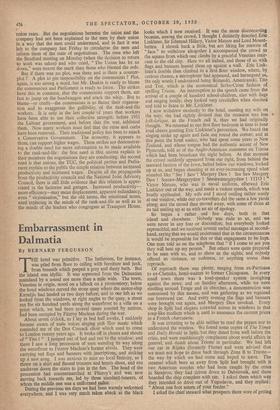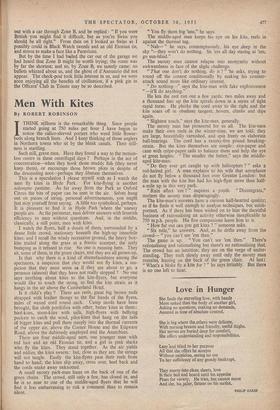Embarrassment in Dalmatia
By BERNARD FERGUSSON THE hotel was primitive. The bathroom, for instance, was piled from floor to ceiling with furniture and junk, from beneath which peeped a grey and dusty bath. But the island was idyllic. It was separated from the Dalmatian mainland by a sound not more than a mile wide. The town, Venetian in origin, stood on a hillock on a promontory; below the hotel windows curved the stone quay where the motor-ship Karadjic had landed us two days before; and to our left as we looked from the windows, at right angles to the quay, a street ran for six hundred yards along the waterfront to a villa on a point which, we had been several times assured by natives, had been occupied by Fitzroy Maclean during the war. About seven o'clock, as I lay in bed half awake, I suddenly became aware of male voices singing rich Slav music which reminded me of the Don Cossack choir which used to come to London twenty years ago. It broke off in cheers and shouts of " Tito I " I jumped out of bed and ran to the window; and there I saw a long procession of men wending its way along the waterfront to Fitzroy Maclean's former abode. They were carrying red flags and banners with inscriptions, and striking up a new song. I was anxious to miss no local festivity, so I thi'ew on a shirt and flannel trousers and tennis shoes, and ran unshaven down the stairs to join in the fun. The head of the procession had countermarched at Fitzroy's and was now moving back towards me, led by three standard-bearers, of whom the middle one was a uniformed sailor.
During the previous ten days we had been warmly welcoined everywhere, and I was very much taken aback at the black looks which I now received. It was the more disconcerting because, among the crowd, I thought I distinctly descried Erie Linklater, Sir Edmund Hillary, Victor Mature and Lord Mount- batten. I shrank back a little, but not liking for reasons of " face " to withdraw altogether I accompanied the crowd to the square from which one climbs by a graceful Venetian stair- case to the old city. Here we all halted, and those of us with flags and banners leaned them up against a wall. Eric Link- later's double then climbed to a first floor window, where, by curious chance, a microphone had appeared, and harangued us, the only words I understood being Britanski, Americanski, Tito and Trst, which is the economical Serbo-Croat fashion of spelling Trieste. An interruption to the speech came from the arrival of a couple of hundred school-children, also with flags and singing lustily; they looked very crestfallen when shushed and told to listen to Mr. Linklater.
I now withdrew modestly to the hotel, meeting my wife on the way; she had rightly divined that the occasion was less folk-lorique, as the French call it, than we had originally thought. We returned to our first floor bedroom in time to hear loud cheers greeting Eric Linklater's peroration. We heard the singing strike up again and fade, out round the corner; and at this point the hotel waiter, who had spent some years in New Zealand. and whose tongue had the authentic accent of New Plymouth, told us of the Anglo-American statement on Trieste which had been broadcast the night before. At that moment the crowd suddenly appeared from our right, from behind the seaward bastion of the town, halted below our windows, looked up at us, and began shouting at an ever-increasing speed what sounded like " See ! Saw ! Margery Daw I See Saw Margery Daw I Seesaw-Margerydaw ! Seesawmargerydaw I TITO 1 " Victor Mature, who was in naval uniform, elbowed Eric Linklater out of the way, and made a violent speech, which was loudly applauded. My wife and I stood smiling rather wanly at our window, while our co-travellers did the same a few yards along; and the crowd then moved away, with some of those at its tail smiling up at us with an air of apology.
So began a rather sad few days, both in that island and elsewhere. Nobody was rude to us, and we were never in any fear or discomfort; but everybody looked reproachful, and we received several verbal messages at second- hand, saying that we would understand that in the circumstances it would be impossible for this or that engagement to be kept. One man told us on the telephone that " if I come to see you they will beat up my person." But others were quite prepared to be seen with us, and to show us the sights; and nobody offered us violence, or rudeness, or anything worse than reproach. Of reproach there was plenty, ranging from ex-Partisans to ex-Chetniks, hotel-waiters to former Chicagoans. In every small town there was a loud-speaker system inveighing against the news; and on Sunday afternoon, while we were strolling around Trogir and its churches, a demonstration was summoned by this means, and was gathering as we regained our borrowed car. And every evening the flags and banners were brought out again, and Margery Daw invoked. Every shop in Split had slogans scrawled across its windows in that soap-like medium which is used to announce the current prices in a French charcuterie.
It was irritating to be able neither to read the papers nor to understand the wireless. We found some copies of The Times and Daily Herald in Split, but they dated from well before the crisis, and were maddeningly complacent about world affairs in general, and. dumb about Trieste in particular. We had left our car in Rijeka (formerly Fiume) and were advised that we must not hope to drive back through Zone B to Trieste— the way by which we had come and hoped to leave. The steamer which bore us away from Split had brought with it two American couples who had been caught by the crisis in Sarajevo; they had driven down to Dubrovnik, and there boarded the ship complete with car. I asked them, which way they intended to drive out of Yugoslavia, and they replied: " About one foot astern of your fender."
I asked the chief steward what prospects there were of getting out with a car through Zone B, and he replied : " If you were British you might find it difficult, but as you're Swiss you should be all right." From then on I looked as Swiss as I possibly could in Black Watch tweeds and an old Etonian tie, and strove to make a face like a Paravicini.
But by the time I had bailed the car out of the garage we had heard that Zone B might be worth trying; the route was by far the shortest; and so, by Zone B, we tamely came; no bullets whizzed about us, and the ghost of d'Annunzio did not appear. The check-post took little interest in us, and we were soon enjoying all the benefits of civilisation, if a pink gin in the Officers' Club in Trieste may be so described.



































 Previous page
Previous page